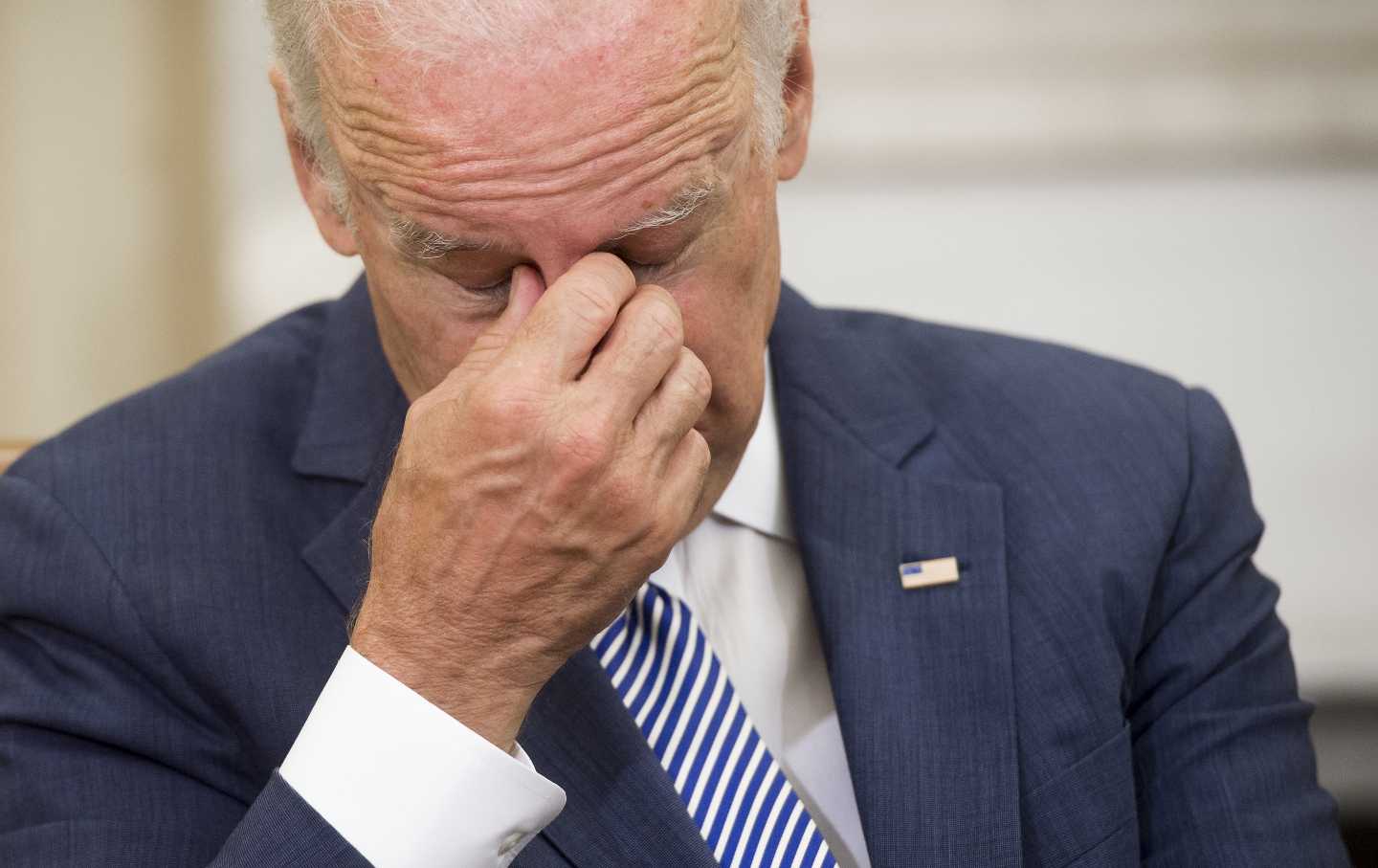
[ad_1]
To rescue the president’s faltering campaign, Democrats need to send in their A team.

As Joe Biden’s reelection bid continues to falter, Democrats have to admit that the problem is either the message or the messenger. Two contradictory trends paint a bleak picture of a president who can’t get credit from the public for his genuine achievements. Writing in Forbes, New School economist Richard McGahey noted that with May’s unexpectedly strong employment report, which tallied the creation of 272,000 new jobs, “the Biden Administration’s robust and durable track record on jobs and unemployment is breaking records, putting up some of the best results we’ve seen in half a century.” Yet May was also when, according to Reuters, “Biden’s public approval rating…fell to its lowest level in almost two years, tying the lowest reading of his presidency in a warning sign for his reelection effort.”
Biden’s strong economic record should be giving him a lift. The economy has seen sustained job growth since January 2021. And not only does the resulting tight labor market particularly help low-income workers get better wages, but the surge in inflation produced in large part by Covid-induced supply-chain disruptions has been tamed, and the stock market has hit record highs. Higher interest rates continue to bite into anyone who takes out a mortgage or loan, but the fact remains that 72 percent of Americans, according to a Federal Reserve survey, feel that their personal finances are OK.
Yet none of this genuinely good economic news is helping Biden. According to Gallup, only 38 percent of Americans trust him to do the right thing on the economy—“among the lowest Gallup has measured for any president since 2001.” By contrast, Trump has the trust of 46 percent of the public on this issue.
Not only is Biden failing to win over the public on the economy, but there are worrisome signs that his campaign is throwing in the towel on the issue. On June 7, Politico reported, “Inside Biden’s orbit, the fear is that there’s little new the administration can do to change the perceptions of a stubborn electorate that’s living through an upswing—yet simply refusing to believe it.”
Political scientist Joshua A. Cohen has persuasively argued that the biggest problem with the Biden campaign is Biden himself. Since the botched withdrawal from Afghanistan, many voters have lost faith in Biden’s competence. He’s seen as too old for the presidency, a problem exacerbated by his increasingly faltering gait and halting speech pattern.
On the age front, argues New York magazine’s Jonathan Chait, a Biden defender, “there’s no aspect of the presidency other than communications that [Biden has] been inhibited from doing.” Unfortunately for Biden, communication is a big part of a president’s job, especially in an election year.
Current Issue

It may be too late for the Democrats to switch horses now—there’s no clear mechanism for replacing Biden with another candidate. Despite the fantasies of some pundits, the days of the smoke-filled room are past. But just because Biden is the party’s standard-bearer doesn’t mean he should be its only hope of persuading voters.
It’s time for Democrats to assemble and unleash an A team of surrogates who can persuade the voters who long ago tuned Biden out. The good news is that downballot Democrats are often more popular than Biden. As ABC reports, “Democratic candidates have led in most recent polls of key Senate races like Arizona, Michigan, Nevada, Pennsylvania and Wisconsin even as President Joe Biden trails former President Donald Trump in the very same polls.”
The Democratic A team would be led by Barack Obama, who has experience winning a reelection campaign against the headwind of economic pessimism. As in 2012, when he upbraided Mitt Romney as a heartless vulture capitalist, Obama could deploy his unique charisma to undermine Trump’s faux populism. Trump’s support for massive tax cuts for the rich would be a particularly ripe target.
Other members of the A team would be senators like Bernie Sanders, Elizabeth Warren, Sherrod Brown, and Raphael Warnock—and governors like Gretchen Whitmer and Andy Beshear. Because of their established popularity, these figures can not only mobilize the Democratic base but also reach out to wavering independents with a message of economic populism. They can both praise Biden’s achievements and, more important, highlight the areas where Democrats and Republicans are at odds: prescription drug prices, student debt relief, corporate price gouging, and taxing the rich. These are all winning issues for the Democrats. But it’ll take an A team to make the public hear the message.
The super-surrogate strategy is such an obviously good idea that the Biden White House was touting it last year. Unfortunately, it turned out to be all talk and little action: Super surrogates were praised as a way to strengthen party unity and also, cynics might argue, preclude a primary challenge to Biden. But a real super-surrogate campaign wasn’t even tried. The strategy needs to be launched before it is too late.
Editor’s Note: This article was written and originally published before the June 27 Presidential debate.
Thank you for reading The Nation
We hope you enjoyed the story you just read, just one of the many incisive, deeply-reported articles we publish daily. Now more than ever, we need fearless journalism that shifts the needle on important issues, uncovers malfeasance and corruption, and uplifts voices and perspectives that often go unheard in mainstream media.
Throughout this critical election year and a time of media austerity and renewed campus activism and rising labor organizing, independent journalism that gets to the heart of the matter is more critical than ever before. Donate right now and help us hold the powerful accountable, shine a light on issues that would otherwise be swept under the rug, and build a more just and equitable future.
For nearly 160 years, The Nation has stood for truth, justice, and moral clarity. As a reader-supported publication, we are not beholden to the whims of advertisers or a corporate owner. But it does take financial resources to report on stories that may take weeks or months to properly investigate, thoroughly edit and fact-check articles, and get our stories into the hands of readers.
Donate today and stand with us for a better future. Thank you for being a supporter of independent journalism.
Jeet Heer
Jeet Heer is a national affairs correspondent for The Nation and host of the weekly Nation podcast, The Time of Monsters. He also pens the monthly column “Morbid Symptoms.” The author of In Love with Art: Francoise Mouly’s Adventures in Comics with Art Spiegelman (2013) and Sweet Lechery: Reviews, Essays and Profiles (2014), Heer has written for numerous publications, including The New Yorker, The Paris Review, Virginia Quarterly Review, The American Prospect, The Guardian, The New Republic, and The Boston Globe.
[ad_2]